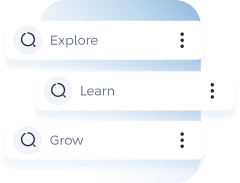
Refine Your Search
...
Explore Financial Academy
About the Academy
Discover our Rich, 60-Year Journey
Jadarat
A Comprehensive System for Skill and Knowledge Development
Governance
Meet our Inspiring Leadership
Success Stories
Check out our Clients’ Reviews and Testimonials


...


25 Reviews
Enhance your competence in insurance claims management with a program accredited by the Chartered Insurance Institute (CII).
25 Reviews
The program focuses on providing participants with a comprehensive understanding of claims management. It covers the fundamental principles of handling claims, understanding insurance products and related services, as well as the key considerations and procedures involved in claims management. The program also addresses the structure of the claims function, effective settlement processes, and the management of related expenses. The goal is to enhance participants’ ability to apply best practices in claims management to ensure efficiency and fairness in processing and settlement. The program is delivered in collaboration with the Chartered Insurance Institute (CII) and includes: registration and membership fees with the CII, a preparatory course, and the professional exam fees.

Insurance


Operations

Not Exist

Lecture
Brainstroming +2
Lecture
Brainstroming
Practical Implementation
Dialogue Teams
Pre Assessment
Post Assessment +1
Pre Assessment
Post Assessment
Simulation Test for professional exam
Claims
This provides you with the opportunity to select the available times that suit you best for participation in our program. These times represent slots during which we are ready to welcome you and provide assistance and guidance.






Describe the legal requirements for a valid claim
Describe the different types of policy conditions relating to claims
Describe what documentary and supporting evidence are required when notifying a claim
Explain what is meant by proximate cause and how it is applied

Describe features, extensions and exclusions of motor policies
Describe features, extensions and exclusions of household, gadget, travel and extended warranty
Describe features, extensions and exclusions commercial property and pecuniary policies
Describe features, extensions and exclusions commercial liability policies
Describe features, extensions and exclusions of health policies

Describe the role of the claims department
Explain the importance of service standards and managing customer expectations
Explain the different parties to an insurance claim
Explain the importance of claims estimating and how reserving operates
Explain how fraud affects insurance claims
Describe the ways in which a claims department may ensure that customers are treated fairly
Describe how disputes and complaints could be resolved or escalated

Describe claims handling procedures for motor policies
Describe claims handling procedures for household, gadget, travel and extended warranty
Describe claims handling procedures for commercial property and pecuniary policies
Describe claims handling procedures for commercial liability policies
Describe claims handling procedures for health policies
Explain the roles of externport services used in the claims processal sup.

Describe the key features, structure and objectives of different claims systems
Describe the claims function as it appears in functional and divisional structures

Describe the way that claims can be settled.
Describe why a full indemnity may not always be paid.
Explain how insurers can recover the cost of claims.
Describe the methods used to mitigate the risk of untraced/uninsured drivers

Describe the role of the claims manager
Explain what claims leakage is and how to identify and reduce it
Explain the types of financial monitoring and how this can impact an insurance company results
Explain the basis and significance of reserving practice.
Understanding the general principles of the claims handling process.
Become familiar with insurance products and associated services.
Understand claims considerations and administration.
Understand claims handling procedures and related claims services.
Explore the claims function and how it is structured.
Understand claims settlement.
Gain awareness of expense management.
